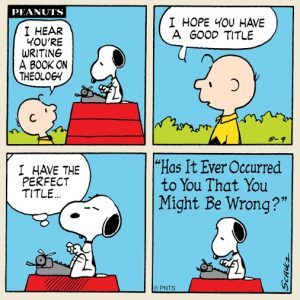 A narrative is a story, right? And I believe we tend to use stories to describe things.
A narrative is a story, right? And I believe we tend to use stories to describe things.
Sometimes it’s things that have happened to us and sometimes it’s things that have happened to others. Sometimes our narratives are developed from personal experience, and sometimes they are inherited from others who influence us, like our parents, teachers, coaches, spiritual advisers, etc. Sometimes these narratives even come unsolicited from the world around us: through news media, social media, books, and articles we read.
If I think about it, I carry thousands of such narratives around in my head. They help me explain the world around me—judge it as good or bad, right or wrong, attractive or ugly.
And therein lies my problem.
My entire coaching agenda revolves around my clients avoiding judging. When I think of the thousands of narratives we all carry with us, it certainly makes getting to a place where we can stop judging damned difficult, doesn’t it? Our narratives are in place specifically to support our judgments.
In order to begin backing away from judging things, actions, people, etc., then, it seems logical that I need to neutralize my narratives. I could do well by temporarily setting aside my narrative and absorbing another, if for no other reason than to test-fly it.
I was schooled in the 50s and 60s. I learned (and it became part of my narrative) that Lincoln freed the slaves and that the slaves were granted land and political capital during reconstruction. That was even supported by my great-great-uncle’s memoirs from his Union service in the Civil War, where he idealistically painted a picture of the newly freed blacks with lots of hope.
Missing from my narrative education (corrected in the meantime) were stories of lynching and the Tulsa massacre. It simply was not part of the public education curriculum back then.
Coming into the late 60s as a teen, then, I was confused about why Watts, Newark, and Kent State happened. What was all the fuss about?
The fuss was about how misaligned my narrative was.
Until I questioned my story, which founded my beliefs, I had no room in my own narrative for a different one.
For demonstration purposes, I’ll use our current U.S. president.
Narrative A (held by about 50% of the voting population): “Trump is an amateur, narcissistic, racist who will destroy our country and its system of government.” This narrative, repeated and supported by similarly thinking individuals, news media, and social media, makes it harder and harder for those so believing to have any room in their narratives for something else.
Narrative B (held by the other approximately 50% of voters): “Trump has a long list of accomplishments that have made life better in the U.S. both financially and socially. He has fulfilled more of his campaign promises than any of his predecessors.” This narrative, repeated and supported by similarly thinking individuals, news media, and social media, makes it harder and harder for those so believing to have any room in their narratives for something else.
Both of these narratives are supported by other narratives that lead to unwavering judgments. And most on both sides are unwilling or unable to open up their narrative to allow another in.
This is the epitome of a knower/judger vs knower/judger rant: Nobody backs down.
Of course I picked a nationally prominent example, but lesser examples can also cause strife in my life. Normally task-oriented folks often struggle with people-oriented folks. And many people with “big picture” narratives have difficulties understanding nitpickers. There are literally thousands and thousands of these “others” that we deal with daily. And most times we don’t feel a need to explore the disconnect.
I strongly believe it’s our narratives—our supporting stories—that cement our beliefs. However we came by them, whether personally or second-hand, they are almost certainly not entirely accurate. And having no room in my narrative for parts of yours leaves no room for improvement. So judging people, situations, and results based on my iron-clad beliefs that are supported by my narratives, which are probably not accurate, seems like a formula for friction.
I’m making more room amid my narratives every day for new perspectives, new thought processes, new data, and a new connection with all folks in my sphere that I heretofore judged as “difficult.”
Be brave. Experiment with it. Give it a try.


